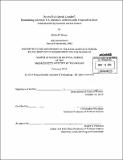Do the rich speak louder? : examining whether U.S. Senators differentially respond to their constituents by income across issues
Author(s)
Heaps, Elisha W. (Elisha Windi)
DownloadFull printable version (20.43Mb)
Alternative title
Examining whether U.S. Senators differentially respond to their constituents by income across issues
Other Contributors
Massachusetts Institute of Technology. Department of Political Science.
Advisor
Christopher Warshaw.
Terms of use
Metadata
Show full item recordAbstract
This thesis examines the relationship between public opinion and the way senators vote on specific issues, and how this "responsiveness" might vary across income groups. The independent variable of interest, state-level income group preference, is estimated using multilevel regression and post-stratification (MRP) analysis. This is an improvement over earlier methods, particularly when modeling income group level opinion where there are insufficient sample sizes in national surveys. Income group opinions are found to be distinct across issue areas and the top ten percent of the income bracket are found to hold different opinions when compared to a more inclusively defined high-income group. Ideal point estimation is used to generate the dependent variable of senator responsiveness based on roll call votes. The first-stage MRP estimates of state-level income group opinion are then regressed on the corresponding senators' ideal points by issue area. While this paper expected the second stage analysis to support an Instructed-delegate model of responsiveness, where senators vote in accordance with constituents' interests, no evidence of such a relationship is found, even at the aggregate opinion level. The evidence suggests that senators are looking elsewhere when making their policy decisions.
Description
Thesis: S.M., Massachusetts Institute of Technology, Department of Political Science, 2014. Cataloged from PDF version of thesis. Includes bibliographical references (pages 158-164).
Date issued
2014Department
Massachusetts Institute of Technology. Department of Political SciencePublisher
Massachusetts Institute of Technology
Keywords
Political Science.